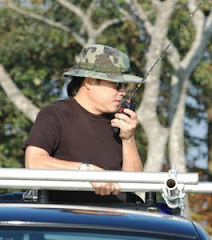
"I don't like comfort and security," the British director of Battlefield Earth, the upcoming film based on L. Ron Hubbard's 1982 novel, told SPACE.com. "I like it when my back's against the wall."
"At the end of the day the truth is out -- it's a pulp sci-fi adventure," he said. "I had the truth on my side. People worry about [scientology], but I don't and can't. We live in a democratic world and you choose to say yes or no."
Christian said he rebels against the image of the "control freak" director by embracing what he called a "joy of shooting." This means artistic freedom for all involved, especially actors.
"I believe in liberating actors," he said. "If you hire great talent, then let them push themselves."
Christian praised typically soft-spoken actor Forest Whitaker, who plays one of the evil Psychlo aliens. In his first scene, Christian said Whitaker scared the costar Barry Pepper right off the set.
"[Whitaker] came out there with this voice that was just huge and raging," he said. "I said, 'Cut.' Forest said, 'Where did that come from?' I said, 'Barry, you didn't hit your mark!' And Barry said, 'I was afraid.'"
Whitaker and star John Travolta surprised Christian again in a scene where the two Psychlos talk in a bar.
"They said, 'Let's play the scene drunk,' and, of course, they were right," he said. "It became one of those scenes we applauded and couldn't stop laughing at."
Because of the film's relatively modest budget (about $60 million) and huge special effects needs, Christian said many of his friends told him he was nuts to take the job.
"Every single morning when I got up I said, 'I can't get through today's schedule,'" he said. "My [assistant director] said, 'I'll get you through the first six weeks, then you're on your own.'"
But once again, Christian's inner rebel finagled a way -- lots of ways -- to stretch that $60 million during the Montreal shoot.
First, he said, shooting in Canada reduced the budget by almost half. Set designers refit an old opera house to stand in for a collection of log cabins, and the whole crew rushed to shoot scenes at an abandoned shopping mall before it was torn down.
Christian also used his relaxed shooting style to save money when shooting scenes where humans talk to the nine-foot tall Psychlo aliens. Instead of using expensive blue screen effects to show the size difference, Christian said he and cameraman Giles Nuttgens tilted, or "dutched," the camera to shoot the aliens from below.
More than a budget fix
"We didn't want to use blue screen because there'd be no performances, no interaction," he said. "But with dutching we could get great visions. Giles said, 'Let's do the whole film like this.' "
This gives the film a "comic book" style reminiscent of the old Batman TV series, Christian said, noting that he first saw this style in Jean-Luc Godard's somber, ultra-low-budget Alphaville (1965).
But most importantly, Christian's willingness to hire two unproven effects firms saved money and gave young talent a big opportunity.
"I don't say, 'I want to work with these people in L.A.,' " he said. "They did some outstanding work for us. ... I think that's the way this business should be."
Because Travolta has been campaigning more than 10 years to make Battlefield Earth, many call the film the actor's labor of love. Christian agreed, saying that Travolta's passion brought in some high-powered, money-saving talent.
The big guns included model maker Bill Pearson (Alien, Flash Gordon), and explosion expert Joe Viskocil, the man behind such carnage-fests as Armageddon and Independence Day.
"Joe read the book and said, 'I want to be a part of this. Pay me whatever you can,'" Christian said.
So they saved money, but does the film look cheap? Christian says no, and he has a pretty good endorsement -- from George Lucas.
Christian, who was a set decorator for the original Star Wars and second unit director for The Phantom Menace, recently showed his film to Lucas.
And?
"It was daunting, but he was very complimentary," he said. "Then he grilled me on how I did all these effects in so short a time for so little money."
Science fiction and the modern myth
All right, Roger, you've worked on two Star Wars movies. What about Episode II?
"I'll go and see what they're doing, but I'm not involved," he said. "I think I'm getting withdrawal symptoms."
Back to Hubbard's story, which Christian said gives us more of what we need and what George Lucas' films gave us -- modern-day myths.
"Fairy stories are lacking now in children's education," he said. "Star Wars fulfills the need for myth. That really helps kids growing up."
He added, "When L. Ron Hubbard wrote [Battlefield Earth], the world was starting to get overrun by robots and computers, so sci-fi was very cold and sterile," he said.
"Hubbard said, 'I want to read about humanity,' so he wrote about it."
Basic mathematics: sequel inevitable
Christian said the point of the book is "knowledge equals powers, not guns." To realize this theme, he focused on a key scene he called, "The Dawn of Man."
The Psychlos force hero Jonnie Goodboy Tyler (Pepper) to use a learning machine to get an education in a matter of days. During the training, Tyler shows some of human prisoners how to draw a triangle.
"That moment was the 'Dawn of Man,'" Christian said. "I said this to the actors and I told [composer] Elia Cmiral to amplify this moment."
The film covers the first half of the 1,000-page novel, and a sequel is already in the pipeline. And despite the grim tone of the first film, Christian said he told Cmiral to support this uplifting, humanistic theme with music throughout.
"The score was very pertinent because the film could be very depressing," he said. "Humans are having a very bad time. I told [Cmiral] to fight this and make the music heroic."



























































































































